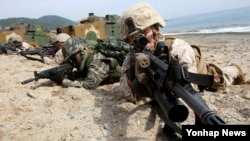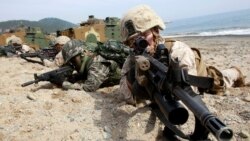Recent provocative actions by North Korea, also known as the DPRK, serve as yet another reminder of the threat posed by the DPRK’s nuclear, ballistic missile, and proliferation programs.
On March 26, North Korea launched two medium-range ballistic missiles in direct violation of United Nations Security resolutions prohibiting such launches.
The Security Council condemned the DPRK’s launches March 28 as a clear violation of multiple UN Security Council resolutions and agreed to consult on an appropriate Council response. The DPRK on March 30 announced that it would conduct additional launches and, possibly, a “new type” of nuclear test.
On March 31, North Korea fired hundreds of artillery shells, including across the Northern Limit Line in the Yellow Sea, during a live-fire exercise. Close to one hundred landed in South Korean waters. South Korea responded by returning fire into North Korean waters.
State Department Deputy Spokesperson Marie Harf called the DPRK’s artillery barrage “a deliberate decision to further escalate tensions”:
“This provocative barrage follows a number of short-range and medium-range ballistic missile launches, threats to conduct a nuclear test, and other provocative statements that we’ve seen over the past several weeks. Once again, we call on the D.P.R.K. to cease and desist from needlessly threatening regional peace and security, and would note that these kinds of provocations only strengthen the resolve of the international community and deepen Pyongyang’s isolation.”
Ms. Harf stressed that North Korea’s leaders face a choice: “They can choose to further escalate, or they can choose to come in line with their international obligations and rejoin the international community. Unfortunately, what we’ve seen recently…is the former.”
U.S. Secretary of Defense Chuck Hagel, who is on a ten-day trip to the Asia Pacific that includes a visit to China, said at a press briefing that he would raise the subject of North Korea with his Chinese counterpart. “The North Koreans have to stop these provocative actions,” said Mr. Hagel. “We have been very clear on that.”
On March 26, North Korea launched two medium-range ballistic missiles in direct violation of United Nations Security resolutions prohibiting such launches.
The Security Council condemned the DPRK’s launches March 28 as a clear violation of multiple UN Security Council resolutions and agreed to consult on an appropriate Council response. The DPRK on March 30 announced that it would conduct additional launches and, possibly, a “new type” of nuclear test.
On March 31, North Korea fired hundreds of artillery shells, including across the Northern Limit Line in the Yellow Sea, during a live-fire exercise. Close to one hundred landed in South Korean waters. South Korea responded by returning fire into North Korean waters.
State Department Deputy Spokesperson Marie Harf called the DPRK’s artillery barrage “a deliberate decision to further escalate tensions”:
“This provocative barrage follows a number of short-range and medium-range ballistic missile launches, threats to conduct a nuclear test, and other provocative statements that we’ve seen over the past several weeks. Once again, we call on the D.P.R.K. to cease and desist from needlessly threatening regional peace and security, and would note that these kinds of provocations only strengthen the resolve of the international community and deepen Pyongyang’s isolation.”
Ms. Harf stressed that North Korea’s leaders face a choice: “They can choose to further escalate, or they can choose to come in line with their international obligations and rejoin the international community. Unfortunately, what we’ve seen recently…is the former.”
U.S. Secretary of Defense Chuck Hagel, who is on a ten-day trip to the Asia Pacific that includes a visit to China, said at a press briefing that he would raise the subject of North Korea with his Chinese counterpart. “The North Koreans have to stop these provocative actions,” said Mr. Hagel. “We have been very clear on that.”






